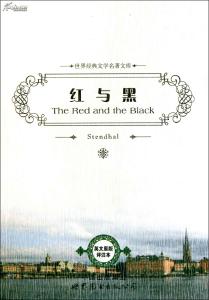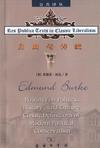红与黑英语读后感(一)
The writer writing unfolds, first is entire French society's one typical window -----small city Varriale's political pattern. The aristocrat is born German Switzerland that mayor is restores the dynasty in here highest representative, the maintenance restoration political power, prevents the bourgeoisie free party member is in power in politics regards as the inherent responsibilities. Poor collection post manager Valno the promise originally is the petty bourgeois, as a result of hires oneself the church secret organization saint can obtain the now the fat difference, thus oneself with restoration political power hitch in same place. Transcription hall Father Maslon is the spy which the church sends, all people's words and deeds all under his surveillance, the time which mutually supports in this king place and the sacrificial altar, is person which wields great power with great arrogance. These three people constitute " Three heads Politic ", reflected the restoration influence the aspect which you the city arrogated all powers to oneself in Varriale.But their opposite, is a large number, has the huge economic potentiality aggressive bourgeoisie free party member. Stendhal describes to the people guarantees king party member's be domineering and tyrannical, on the one hand again let the people draw such conclusion: Grasps has the economic potentiality the bourgeoisie, also will decide in politics is the final victor. 《 The Red and the Black 》 the book in circulation revolutionized in July, 1830 before, takes charge of soup reaches unexpectedly picture is understands clearly historical movement this one inevitably tends to.
红与黑英语读后感 (二)
During this term, I have read a novel The Red and the Black. The novel was written by the French writer Stendhal in the 19th century. Marie·Henri Beyle, better known by his pen name Stendhal, was one of the critical realism French writers in the 19th century . The military and theatrical worlds of the First French Empire were a revelation to Beyle. Known for his acute analysis of his characters' psychology and reflection of society, he is considered one of the earliest and foremost practitioners of realism in his two novels Le Rouge et le Noir (The Red and the Black, 1830) and La Chartreuse de Parme (The Charterhouse of Parma, 1839)。 Stendhal laid down for himself in a diary entry of May 1804:“regard everything I’ve read to date about man as a prediction; believe only what I have seen for myself. Joy, happiness, fame, all is upon it.” Futurity call it realism creation method. In France, Stendhal was the first litterateur to reveal corruption of the bourgeoisie through literature.
The novel marks the beginning of realism. André Gide said that The Red and the Black was a novel ahead of its time, that it was a novel for readers in the twentieth century. In Stendhal’s time, prose novels included dialogue and omniscient narrator descriptions; his great contribution to literary technique was describing the psychologies (feelings, thoughts, inner monologues) of the characters, resultantly he is considered the creator of the psychological novel.
The paper's opening sentence:“If your characters do not talk about politics, they are not the French in 1830.” is the famous sentence in The Red and The Black. The material of The Red and The Black is based on a realistic event that a tutor killed her hostess in 1827. When Stendhal read the story in the newspaper, he adapted it and wrote the long bildungsroman novel The Red and The Black. The work, previously titled Julien, then, changed into The Red and The Black. The Red symbolizes many things, the uniform of the Napoleon era, Mrs. Renal’s blood, revolution and contribution by the common people. The Black also stands for robes of priests, Martel’s mourning apparel and the plot of church. The subtitle, A Chronicle of the 19th Century, definitely states the time background. Thus it can be seen, Stendhal consciously wrote this political tint novel about society of Bourbon Restoration. The Red and The Black is the first critical realism novel in Europe.
The Red and the Black includes two volumes. It mainly tells the story of Julien Sorel’s life in a monarchic society of fixed social class.The clue of this book is about Julien Sorel’s life experience. From the venal town to the capital Paris, the ghastly seminary to the royalist, love and religious activities to the secret political conferences, The Red and the Black describes a picture of the society under control of Charles X of France.
Book I Julien Sorel is an ambitious son of a carpenter in the Verrières village, in Franche-Comté, France, who would rather read and daydream about the glory days of Napoleon's long-disbanded army. In the event, Julien Sorel becomes an acolyte. Later, the local Catholic prelate secures him a post as the tutor for the children of Monsieur de Rênal, the mayor of Verrières. He falls in love with Monsieur de Rênal’s wife; it ends badly when exposed to the village, by her chambermaid, Elisa. Then, Julien goes to a seminary in Besan?on, which he finds intellectually stifling and pervaded with social cliques. Disgusted by the Church’s political machinations, Julien recommends himself as private secretary to the diplomat Marquis de la Mole, a Roman Catholic legitimist.
Book II chronicles the time leading to the July Revolution of 1830, and Julien Sorel’s Parisian life, as an employee of the de la Mole family. Despite moving among high society, the family and their friends, condescend to Julien for being an uncouth plebeian — his intellectual talents notwithstanding. In his boundlessly ambitious rise in the world, Julien perceives the materialism and hypocrisy important to the elite of Parisian society, and that the counter-revolutionary temper of the time renders it impossible for well-born men of superior intellect and esthetic sensibility to progressively participate in the public affairs of the nation with any success. Meanwhile, in the preceding months, the Marquis’s bored daughter, Mathilde de la Mole, had become emotionally torn, between her romantic attraction to Julien, for his admirable personal and intellectual qualities, and her social repugnance at becoming sexually intimate with a lower-class man. At first, he finds her unattractive, but his interest is piqued, by her attentions and the admiration she inspires in others; twice, she seduces and rejects him, leaving him in a miasma of despair, self-doubt, and happiness. Only during his secret mission does he gain the key to winning her affections. Consequently, Mathilde sincerely falls in love with Julien, eventually revealing to him that she carries his child; yet, whilst he was on diplomatic mission in England, she became officially engaged to Monsieur de Croisenois, an amiable, rich young man, heir to a duchy.
Although The Red and The Black was written in the 19th century, the novel is still of reflective value to our real world.In the modern society, we still can find out many “Juliens”。 They are young and talented, but low birth. At first, they despise the unfair treatment in the society. They hate corruption of officialdom. They disdain the person who has special power and privileges. However, they always long for joining in the officialdom. The iron hand of cruel necessity broke those Juliens’ wills. Once into the officialdom, they gradually lose themselves. Finally, they even enjoy in it and try to defend themselves.
In fact, they must end of failure like Julien, I think, against their wills, following the wrong mind and taking advantage of the empressement of others. Learning of Julien’s romantic liaison with Mathilde, the Marquis de la Mole is angered, but relents before her determination, and his affection for him, and bestows upon Julien an income-producing property attached to an aristocratic title, and a military commission in the army. Although ready to bless their marriage, he changes his mind upon receiving the reply to a character-reference-letter he wrote to the abbé Chénal, Julien’s previous employer in the village of Verrières; however, the reply letter, written by Madame de Rênal — at the urging of her confessor priest — warns the Marquis that Julien Sorel is a social-climbing cad who preys upon emotionally vulnerable women. On learning the Marquis’s disapproval of the marriage, Julien Sorel travels to his home village of Verrières and shoots Madame de Rênal during Mass in the village church; she survives. Despite the efforts of Mathilde, Madame de Rênal, and the priests devoted to him since his early life, Julien Sorel is determined to die — because the materialist society of Bourbon Restoration France will not accommodate a low-born man of superior intellect and aesthetic sensibility possessing neither money nor social connections.
Reading between the lines, we can find that Julien is a strong-willed and cunning young man who is determined to make his way to the upper society. Julien’s mistrustfulness and his touchy pride were through his life. He reached such heights of perfection in this kind of eloquence, which has replaced the swiftness of action found under the Empire. Julien forgot his dreary role as a rebellious plebeian. When he was in the prison, he awakened and said:” The whole world and the society are hypocritical!” He yelled out:” I love truth, but where is truth? Everyone is hypocritical and trickish, including the great people! ” He refused to appeal. Later, he was sent to the block and ended his life.

Julien is a tragical character in this novel. He represents the young people of Petty Bourgeoisie in the Bourbon Restoration. They are young and talented, but low birth. Finally, they end of death. As the novel shown, the society under control of Charles X of France was dark. There was no middle way for them. The connection between people was only money, even between father and son. When Julien was in the prison, his father visited him. At the beginning, his father scolded him. He thought that Julien was a shame of his family. While father heard of the money Julien had, father changed his attitude at once. You had money, people respected you; without money, people looked down upon you. In that society, without money, you were nothing! Julien was the victim of cash nexus. I cannot help saying:” It is an eat-man world!” If Julien lives in the modern society, without repress and exploitation of class, I believe, he must be appreciated by others and become a successful person.
Julien Sorel is practical, greedy, and cruel. In order to realize his aim and get rid of poverty, Julien took advantage of Mathilde by hook or by crook. He believed that the end justifies the means. It is true that every one should try his best to achieve what he is pursuing. But we should do it in a proper and moral way. And whatever we do, we shouldn't forget that love and honesty should remain the most cherishable elements in our life.
Today we are living in a harmonious society; we should keep our purity and humanity. Fame and fortune are important, but they are not everything. Love and honesty are of more importance for a peaceful life. We should trust each other, help each other, and take care of each other.
Although Julien ended of death, we still have many things to learn from him. He was low birth, but he always encouraged himself that:” I will be great!” He never gave up. When we encounter some problems, we should try to solve them instead of giving up. Plus, before Julien started a thing, he always had made a plan. Everything must be carefully planned before we act, then twice as much can be accomplished with half the effort.
In a whole, success and opportunity are only given to those people who are well-prepared. I am ready at all times. Are you ready?
注:更多精彩知识请关注爱华知识栏目。
 爱华网
爱华网



